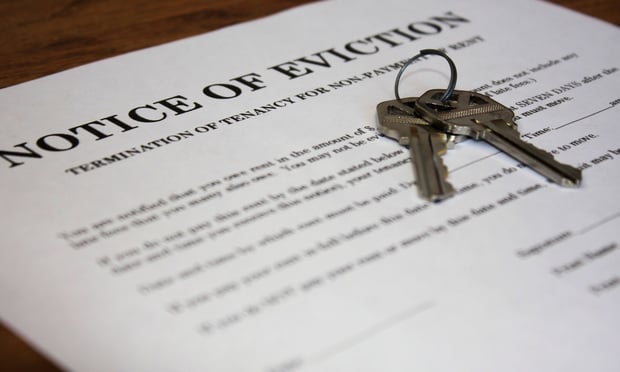Second Circuit Rules 'Rooker-Feldman' Doesn't Bar Suit Against NYC's No-Fault Nuisance Evictions
The plaintiffs' arguments focused on injuries caused by settlement agreements with the city, not with later court ratification of those agreements, the panel found.
December 11, 2018 at 05:18 PM
4 minute read

The U.S. Court of Appeals for the Second Circuit revived a class action over New York City's use of settlement agreements through a no-fault eviction program Tuesday.
The appeals court reasoned that the Rooker-Feldman doctrine should not bar a federal court's jurisdiction when plaintiffs can show injuries that were merely ratified—but not caused—by a state court decision.
The panel—composed of Circuit Judges Peter Hall, Gerard Lynch, and Susan Carney—sent the suit back to the U.S. District Court for the Southern District of New York for further proceedings.
“Plaintiffs are attempting to remedy an alleged injury caused when, prior to any judicial action, they were coerced to settle, not an injury that flows from a state-court judgment,” the panel wrote. “By allowing an action such as this to go forward, we do not risk turning our federal district courts into quasi-appellate courts sitting in review of state-court decisions.”
The Second Circuit, applying a four-part test, focused on the second—a complaint of an injury cased by a state-court judgment—as the core requirement.
Before the court was the critical distinction when a state court simply allows a purported injury to occur, either by ratifying it, acquiescing to it, or allowing it to go unpunished.
The plaintiffs in the underlying suit alleged their rights were violated by the city's program, under a 1970s-era nuisance abatement law, which saw business owners and tenants evicted from property where crimes supposedly occurred. According to the members of the class, the program forced innocent people to waive their constitutional rights without being accused, much less convicted, of a crime.
Each of the plaintiffs argued the settlements they entered into with the city unknowingly waived their constitutional rights and were done involuntarily after being pressured into settling by city attorneys. Most importantly to the appeal, the agreements were “so-ordered” by state judges, dismissing the nuisance actions.
The parties appealed a dismissal of their lawsuit against the city by U.S. District Judge Andrew Carter, who claimed Rooker-Feldman deprived him of jurisdiction over the case. In remanding, the panel found the district court noted that the plaintiffs core argument was about the agreements themselves—not the state-court judgments.
In pointing to prior similar cases, the panel said the plaintiffs brought claims “alleging harm flowing from wrongful conduct leading to settlement terms and do not argue that the state courts committed an error in so-ordering the parties' agreements, the complaint attacks the conduct itself, and the claim does not function as a de facto appeal.”
“The instant case thus does not entail the evil Rooker-Feldman was designed to prevent,” the panel added.
In a statement, Institute of Justice senior attorney Darpana Sheth, who was part of the organization's appellate legal team for the plaintiffs, said the parties were glad the lawsuit will be allowed to proceed.
“The city needs to deliver justice to the hundreds of New Yorkers stripped of their constitutional rights,” Sheth said.
A spokesman said the city's law department was reviewing the decision.
The Rooker-Feldman doctrine developed from 1923's Rooker v. Fidelity Trust and 1983's District of Columbia Court of Appeals v. Feldman. The cases established the principle that federal district courts lack jurisdiction over so-called appeals from state court judgments. After the Supreme Court's 2005 decision in Exxon Mobil v. Saudi Basic Industries, federal courts began limiting what the high court felt was an unintended extension of the Rooker-Feldman holdings. Federal courts were specifically barred from reviewing the consequences to a losing side of a state-court judgment.
Related:
You Can't Sue the Judge, or Can You?
Second Circuit Upholds Dismissal in 'Baffling,' 'Confusing' Suit
Juxtaposition in Foreclosure Defense Litigation: Legislative Intent vs. Practical Reality
This content has been archived. It is available through our partners, LexisNexis® and Bloomberg Law.
To view this content, please continue to their sites.
Not a Lexis Subscriber?
Subscribe Now
Not a Bloomberg Law Subscriber?
Subscribe Now
NOT FOR REPRINT
© 2025 ALM Global, LLC, All Rights Reserved. Request academic re-use from www.copyright.com. All other uses, submit a request to [email protected]. For more information visit Asset & Logo Licensing.
You Might Like
View All


Law Firms Expand Scope of Immigration Expertise Amid Blitz of Trump Orders
6 minute readTrending Stories
- 1Apply Now: Superior Court Judge Sought for Mountain Judicial Circuit Bench
- 2Harrisburg Jury Hands Up $1.5M Verdict to Teen Struck by Underinsured Driver
- 3Former Director's Retaliation Suit Cleared to Move Forward Against Hospice Provider
- 4New York Judge Steps Down After Conviction for Intoxicated Driving
- 5Keys to Maximizing Efficiency (and Vibes) When Navigating International Trade Compliance Crosschecks
Who Got The Work
J. Brugh Lower of Gibbons has entered an appearance for industrial equipment supplier Devco Corporation in a pending trademark infringement lawsuit. The suit, accusing the defendant of selling knock-off Graco products, was filed Dec. 18 in New Jersey District Court by Rivkin Radler on behalf of Graco Inc. and Graco Minnesota. The case, assigned to U.S. District Judge Zahid N. Quraishi, is 3:24-cv-11294, Graco Inc. et al v. Devco Corporation.
Who Got The Work
Rebecca Maller-Stein and Kent A. Yalowitz of Arnold & Porter Kaye Scholer have entered their appearances for Hanaco Venture Capital and its executives, Lior Prosor and David Frankel, in a pending securities lawsuit. The action, filed on Dec. 24 in New York Southern District Court by Zell, Aron & Co. on behalf of Goldeneye Advisors, accuses the defendants of negligently and fraudulently managing the plaintiff's $1 million investment. The case, assigned to U.S. District Judge Vernon S. Broderick, is 1:24-cv-09918, Goldeneye Advisors, LLC v. Hanaco Venture Capital, Ltd. et al.
Who Got The Work
Attorneys from A&O Shearman has stepped in as defense counsel for Toronto-Dominion Bank and other defendants in a pending securities class action. The suit, filed Dec. 11 in New York Southern District Court by Bleichmar Fonti & Auld, accuses the defendants of concealing the bank's 'pervasive' deficiencies in regards to its compliance with the Bank Secrecy Act and the quality of its anti-money laundering controls. The case, assigned to U.S. District Judge Arun Subramanian, is 1:24-cv-09445, Gonzalez v. The Toronto-Dominion Bank et al.
Who Got The Work
Crown Castle International, a Pennsylvania company providing shared communications infrastructure, has turned to Luke D. Wolf of Gordon Rees Scully Mansukhani to fend off a pending breach-of-contract lawsuit. The court action, filed Nov. 25 in Michigan Eastern District Court by Hooper Hathaway PC on behalf of The Town Residences LLC, accuses Crown Castle of failing to transfer approximately $30,000 in utility payments from T-Mobile in breach of a roof-top lease and assignment agreement. The case, assigned to U.S. District Judge Susan K. Declercq, is 2:24-cv-13131, The Town Residences LLC v. T-Mobile US, Inc. et al.
Who Got The Work
Wilfred P. Coronato and Daniel M. Schwartz of McCarter & English have stepped in as defense counsel to Electrolux Home Products Inc. in a pending product liability lawsuit. The court action, filed Nov. 26 in New York Eastern District Court by Poulos Lopiccolo PC and Nagel Rice LLP on behalf of David Stern, alleges that the defendant's refrigerators’ drawers and shelving repeatedly break and fall apart within months after purchase. The case, assigned to U.S. District Judge Joan M. Azrack, is 2:24-cv-08204, Stern v. Electrolux Home Products, Inc.
Featured Firms
Law Offices of Gary Martin Hays & Associates, P.C.
(470) 294-1674
Law Offices of Mark E. Salomone
(857) 444-6468
Smith & Hassler
(713) 739-1250







